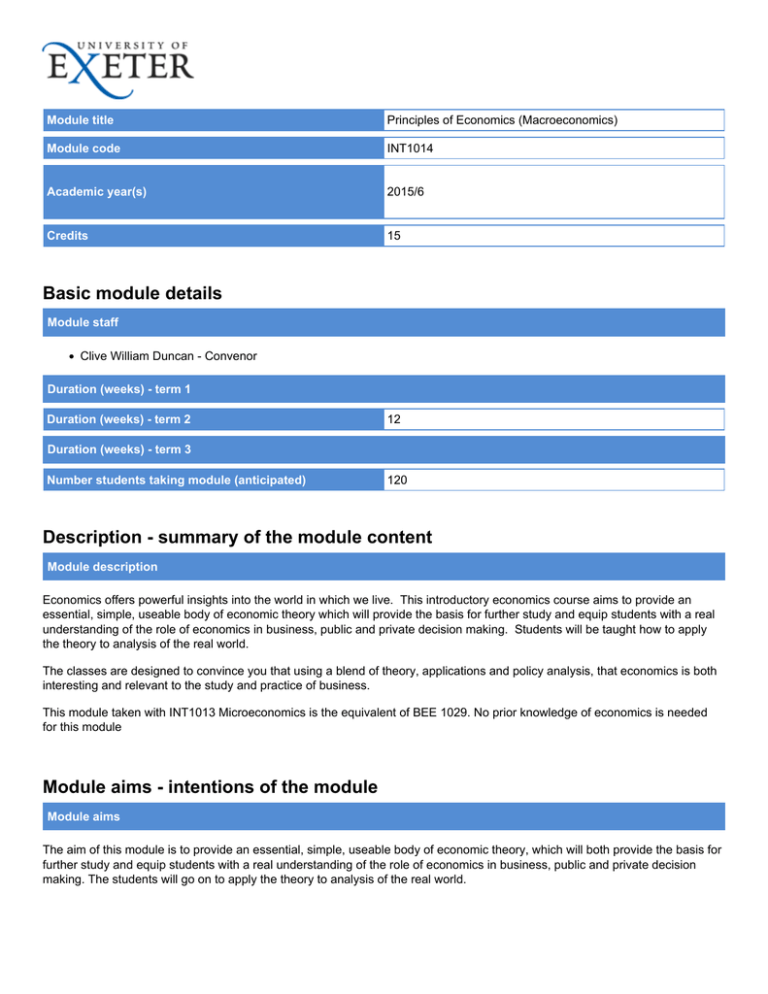Basic module details
advertisement

Module title Principles of Economics (Macroeconomics) Module code INT1014 Academic year(s) 2015/6 Credits 15 Basic module details Module staff Clive William Duncan - Convenor Duration (weeks) - term 1 Duration (weeks) - term 2 12 Duration (weeks) - term 3 Number students taking module (anticipated) 120 Description - summary of the module content Module description Economics offers powerful insights into the world in which we live. This introductory economics course aims to provide an essential, simple, useable body of economic theory which will provide the basis for further study and equip students with a real understanding of the role of economics in business, public and private decision making. Students will be taught how to apply the theory to analysis of the real world. The classes are designed to convince you that using a blend of theory, applications and policy analysis, that economics is both interesting and relevant to the study and practice of business. This module taken with INT1013 Microeconomics is the equivalent of BEE 1029. No prior knowledge of economics is needed for this module Module aims - intentions of the module Module aims The aim of this module is to provide an essential, simple, useable body of economic theory, which will both provide the basis for further study and equip students with a real understanding of the role of economics in business, public and private decision making. The students will go on to apply the theory to analysis of the real world. Intended learning outcomes (ILOs) ILO: Module-specific skills 1. Apply the economic way of thinking to enable them to understand macroeconomic problems 2. Develop an understanding relating to the links between government policies and Macroeconomics, and how these political approaches impact upon the Macroeconomy, this with specific focus upon a Keynesian approach and a Neo-classical approach 3. Describe the Goods, Services, Labour and Financial Markets 4. Construct macroeconomic models and make use of them in analysis of current issues 5. Demonstrate understanding of macroeconomic issues that are given priority by modern governments ILO: Discipline-specific skills 6. Describe the link between current economic problems and economic theory ILO: Personal and key skills 7. Engage in problem solving activities Syllabus plan Syllabus plan The National Economy Macroeconomic Issues and Analysis Roots of Modern Macroeconomics Short-run Macroeconomic Equilibrium Banking, Money & Interest Rates The Relationship of Money and Goods Markets Fiscal & Monetary Policy Supply-side Policies Learning and teaching Learning activities and teaching methods (given in hours of study time) Scheduled Learning and Teaching Activities Guided independent study Placement / study abroad 60 90 0 Details of learning activities and teaching methods Category Hours of study time Description Scheduled learning and teaching activities 24 Lecture Scheduled learning and teaching activities 36 Seminars Study Clinic 12 Optional sessions to reinforce key skills Guided Independent study 40 Reading and research Guided Independent study 20 Practice of techniques Guided Independent study 18 Web-based activities Assessment Formative assessment Form of assessment Size of the assessment (eg length / duration) ILOs assessed Feedback method Class tests Typically 1 hour 1-7 Written and verbal Summative assessment (% of credit) Coursework Written exams Practical exams 0 100 0 Details of summative assessment Form of assessment % of credit Size of the assessment (eg length / duration) ILOs assessed Feedback method Examination 100 1.5 hours 1-7 Verbal during following semester Re-assessment Details of re-assessment (where required by referral or deferral) Original form of assessment Form of re-assessment ILOs re-assessed Timescale for reassessment Written examination 1-7 During next examination period Written examination Re-assessment notes The pass mark for award of credit in this module is 40%. Referral or deferral is a process whereby a further attempt at the module examination, following an initial failure, is permitted without the requirement to repeat any attendance. This will constitute a second formal examination. The grade for the re-assessment, and therefore the module grade, will be capped at 40%. Resources Indicative learning resources - Basic reading Sloman, J., Wride, A. & Garratt, D. (2015). Economics (9th Ed.). Harlow: Prentice Hall. Module has an active ELE page? Yes Indicative learning resources - Web based and electronic resources http://vle.exeter.ac.uk/course/view.php?id=4499 Indicative learning resources - Other resources Cook T., Riches C. & Taylor R.(2015) Economics for Cambridge International AS and A Level. Oxford University Press Parkin & King (1990) Economics (5th Ed.). Addison Wesley Begg, D., Fischer, S. & Dornbusch, S. (2008). Economics (9th Ed.). Economics. Maidenhead: McGraw-Hill. Other details Module ECTS 7.5 Module pre-requisites none Module co-requisites none NQF level (module) 4 Available as distance learning? No Origin date 8/6/2015 Last revision date 8/6/2015 Key words search Economics; Major Macroeconomic Objectives, Circular flow; Injections & Withdrawals, Measuring National Income, Short-term Economic Growth and the Business Cycle, Balance of Payments and Exchange Rates, Aggregate Supply, Aggregate Demand and the level of Prices, Cost Push/Demand Pull Inflation, The Keynesian Approach, The Monetarist Approach, The Financial System, Deriving Equilibrium National Income

